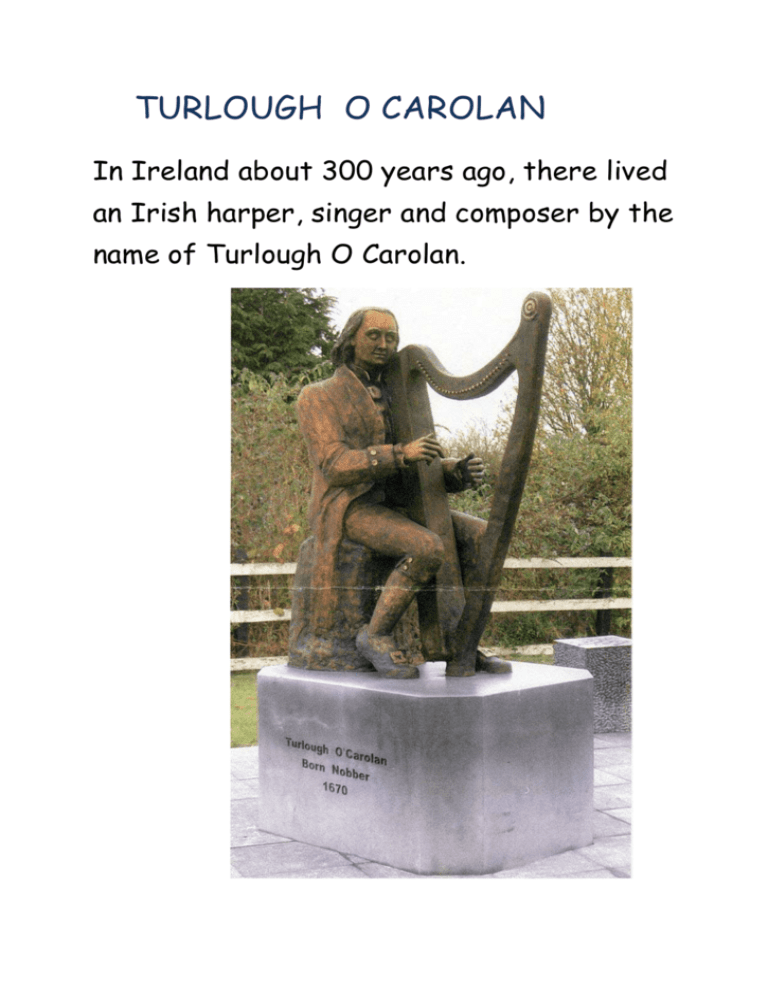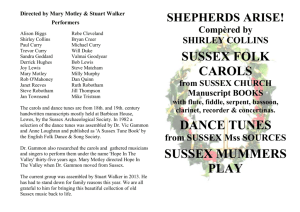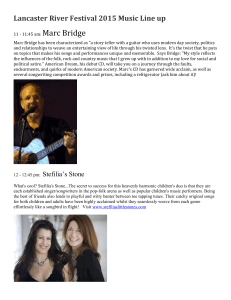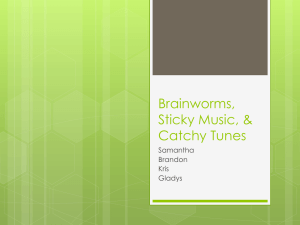Click here to see my project on Turlough O Carolan!
advertisement

TURLOUGH O CAROLAN In Ireland about 300 years ago, there lived an Irish harper, singer and composer by the name of Turlough O Carolan. He was born near Nobber, Co. Meath, in 1670. In 1684 he moved with his family to Ballyfarnon in Roscommon where his father took a job with the MacDermott Rowe family of Alferford House When he was eighteen, he caught small pox. He was left permanently blind. A local noble woman by the name of Mary Fitzgerald Mc Dermott Rowe, who also was the person his Dad worked for, saw that he trained with a harper. From then on Carolan made his living by travelling around from house to house, from castle to castle, entertaining the households of the wealthy people. He travelled with his horse and his harp and a guide who showed him the way. At first, he was not considered a great musician. The ancient bards started to learn the harp when they were still young children. Carolan didn’t start till he was eighteen. One of his patrons, Squire Reynolds, suggested that he compose music. His first work was “Sí Beag Sí Mór “. He became famous for his wonderful music. He played his own tunes and compositions and also the tunes of other harpers. He was very successful and people would often delay weddings and funerals until he arrived. Often as a special favour he would write a tune in honour of the man or the wife or the daughter. He composed lively tunes in honour of people, called “Planxties”. When Turlough was a young man before his blindness he met and fell in love with a girl by the name of Bridget Cruise. Bridget was part of a noble family and Carolan’s family was of skilled labourers so a match could never be made. Even though he lived a very successful life he never forgot about Bridget and wrote four tunes in her honour. He met her again at the end of his life, when he was on a religious retreat in County Donegal. He happened to touch a woman’s hand and instantly recognised that it was hers. In 1720, Carolan married Mary Maguire. He was 50 years of age. Their first family home was a cottage near the town of Mohill in Co Leitrim, where they settled. They had seven children, six daughters and a son. In 1733 Mary died. For almost fifty years, Carolan journeyed from one end of the country to the other, composing and performing his tunes. He usually composed the tune first as he rode from place to place then added words later. His music was first published in Neale's A Collection of the Most Celebrated Irish Tunes in Dublin, in 1726. At least 220 tunes which survive to this day are attributed to him. Many of the tunes attributed to Carolan are older traditional melodies. Carolan composed both songs and instrumental harp music. Except for one song with an English text, all of his songs are in Irish. Most of his songs were dedicated to particular people. Carolan’s most famous tunes are Carolan’s Concerto, Sí Beag Sí Mór and Carolan’s Receipt. Carolan was also famous for his love of drink, especially Irish whiskey. In fact he wrote a tune in honour of whiskey. As he was dying he called for one last cup of his favourite brew. His dying words were “The drink and I have been friends for so long it would be a pity for me to leave without one last kiss.“ And then he died. Carolan is known well around the area where he lived. A harp festival is held every year in Keadue. There is a bronze statue of Carolan in Nobber, where he was born, and another by Oisín O’Kelly in Mohill, where he lived with his family. Derek Bell made an album of Carolan’s music. The Carolan String Quartet are named in Carolan’s honour. Carolan was a great Irish composer. We are lucky to have so many of his tunes. TOIRLEACH O’CEARBHALÁIN le Stíofáin Ó Cinnéide






